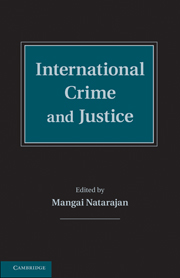Book contents
- Frontmatter
- Contents
- List of Figures
- List of Tables
- List of Contributors
- Foreword
- Preface
- Introduction
- Part I International Criminology
- Part II Law, Punishment, and Crime Control Philosophies of the World
- Part III Transnational Crime
- Part IV Organized Crime and Terrorism
- Part V International crime
- Part VI Delivering International Justice
- 44 The Role of the United Nations
- 45 Treaties and International Law
- 46 International Criminal Tribunals and Hybrid Courts
- 47 The International Criminal Court
- 48 The ICC and the Darfur Investigation
- 49 Victims’ Rights in the International Criminal Court (ICC)
- 50 Nongovernmental Organizations and International Criminal Justice
- 51 Global and Regional Human Rights Commissions
- 52 The Truth and Reconciliation Commission in South Africa
- 53 The Guatemalan Truth Commission
- Part VII International Cooperation and Criminal Justice
- Part VIII International Research and Crime Statistics
- Part IX International research resources
- World Map
- Index
- References
53 - The Guatemalan Truth Commission
Genocide Through the Lens of Transitional Justice
Published online by Cambridge University Press: 05 October 2014
- Frontmatter
- Contents
- List of Figures
- List of Tables
- List of Contributors
- Foreword
- Preface
- Introduction
- Part I International Criminology
- Part II Law, Punishment, and Crime Control Philosophies of the World
- Part III Transnational Crime
- Part IV Organized Crime and Terrorism
- Part V International crime
- Part VI Delivering International Justice
- 44 The Role of the United Nations
- 45 Treaties and International Law
- 46 International Criminal Tribunals and Hybrid Courts
- 47 The International Criminal Court
- 48 The ICC and the Darfur Investigation
- 49 Victims’ Rights in the International Criminal Court (ICC)
- 50 Nongovernmental Organizations and International Criminal Justice
- 51 Global and Regional Human Rights Commissions
- 52 The Truth and Reconciliation Commission in South Africa
- 53 The Guatemalan Truth Commission
- Part VII International Cooperation and Criminal Justice
- Part VIII International Research and Crime Statistics
- Part IX International research resources
- World Map
- Index
- References
Summary
INTRODUCTION
More than thirty truth commissions have been set up throughout the world since the 1970s, in Latin America and Africa, in particular. Truth commissions are typically created either by presidential decrees, as they were in Chile and Peru, or through agreements negotiated between governments and guerrilla forces, as in Guatemala.
The overall purposes of truth commissions are to reach the truth about past atrocities, provide a safe forum for testimonies, write reports of their findings, reconcile opposing groups in war-torn societies, and make recommendations. Truth commissions seek to discover what really happened to people who were forcibly “disappeared,” and to discover where people who were murdered are buried. They provide a safe forum in which victims, survivors, and sometimes perpetrators can publicly attest to violence, abuses, and human rights violations they have experienced or witnessed.
A standard characteristic of truth commissions is that they do not have the power to prosecute, or to grant perpetrators amnesty for their crimes, except in the case of the South African Truth Commission (1996–8). They seek to reconcile war-torn-fragmented societies and yield reports on their findings, which also contain recommendations for steps governments can take to prevent political violence from recurring. In Chile, for example, the Commission recommended that the state provide victims and families with special health programs recognizing and helping to heal their sufferings.
- Type
- Chapter
- Information
- International Crime and Justice , pp. 400 - 406Publisher: Cambridge University PressPrint publication year: 2010
References
- 1
- Cited by



